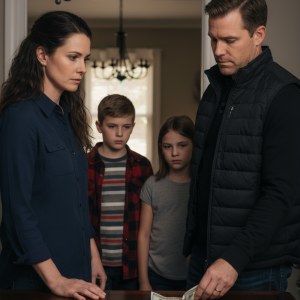Emily’s fingers grazed the fabric of a designer jacket, but her mind was far away. Was this really her life now — helping customers pick outfits, pretending to smile? Just months ago, she’d been a bride-to-be, dreaming of beaches, champagne, and a future she thought she understood. Fate, it seemed, had a dark sense of humor.
Six months earlier, Emily’s wedding day had started like a dream. The flowers were perfect, the guests were laughing, and the air buzzed with anticipation. Only one thing was missing — the groom. Dylan was nowhere to be seen, and as the minutes ticked by, whispers began to spread. Then, the sound of a horn broke the tension.
Out stepped Dylan and his parents — not from a sleek luxury car, but from a battered old Chevy. No flowers, no grandeur, just a modest bouquet from the corner shop. Emily froze. Dylan had always spoken of a comfortable life, of parents who were “far from poor.” And yet here they were, looking nothing like the picture he’d painted.
When she demanded an explanation, Dylan confessed: he wasn’t wealthy at all. He was just a regular working guy. He’d lied because he feared she wouldn’t love him otherwise. The revelation hit like ice water. Emily loved him — but she had never pictured a life scraping by from paycheck to paycheck.
In front of the stunned guests, Emily tossed her bouquet at Dylan’s feet and walked away. The humiliation was bad enough, but it got worse — Dylan’s mother, Helen, told everyone Emily was only marrying for money and was secretly in love with someone else. She even claimed to have “tested” Emily with this stunt.
The truth was nothing like Helen’s story, but no one cared to listen. Emily withdrew from friends, struggled through her final year at university, and spiraled into depression. Then her father suffered a stroke. Her mother, exhausted from caring for him and running the family clothing store, begged Emily to help.
Reluctantly, Emily stepped behind the counter for the first time. To her surprise, she began to enjoy the work — especially after meeting Sophie, a vibrant saleswoman who treated every customer like a runway model. Slowly, Emily started to feel alive again.
One afternoon, an elderly woman came in looking for a wedding outfit for her grandson’s big day. As she chatted, Emily caught the names “Helen” and “Dylan” — names that made her stomach drop. The woman was Dylan’s grandmother, Patricia.
Emily poured out the whole story to Patricia, who listened without judgment. A retired police officer with a knack for digging up truths, Patricia suspected Helen’s hand in the disaster. She promised to “look into things.”
A week later, Patricia invited the entire Harrison family to a café “for a catch-up.” Halfway through, Emily walked in — with a man none of them recognized. That man calmly confessed Helen had paid him to lure Emily into a staged conversation, twisting her words so Dylan’s parents could “confirm” their worst assumptions.
Helen tried to defend herself, claiming she only wanted the best for her son. But the damage was done. Dylan was stunned — and ashamed — to learn the truth. Outside, away from prying eyes, he held Emily’s hand as if he might never let go.
He begged her forgiveness. She admitted she still loved him — and yes, they could try again. This time, no secrets, no silent resentments. Just honesty. They agreed that when they did marry, it would be simple: family only, then off to the sea for a quiet honeymoon.
The lies that had torn them apart were gone. What remained was the truth, and the choice to start fresh. Sometimes, the hardest “I do” is the one you make after the world thinks your love story is over.





